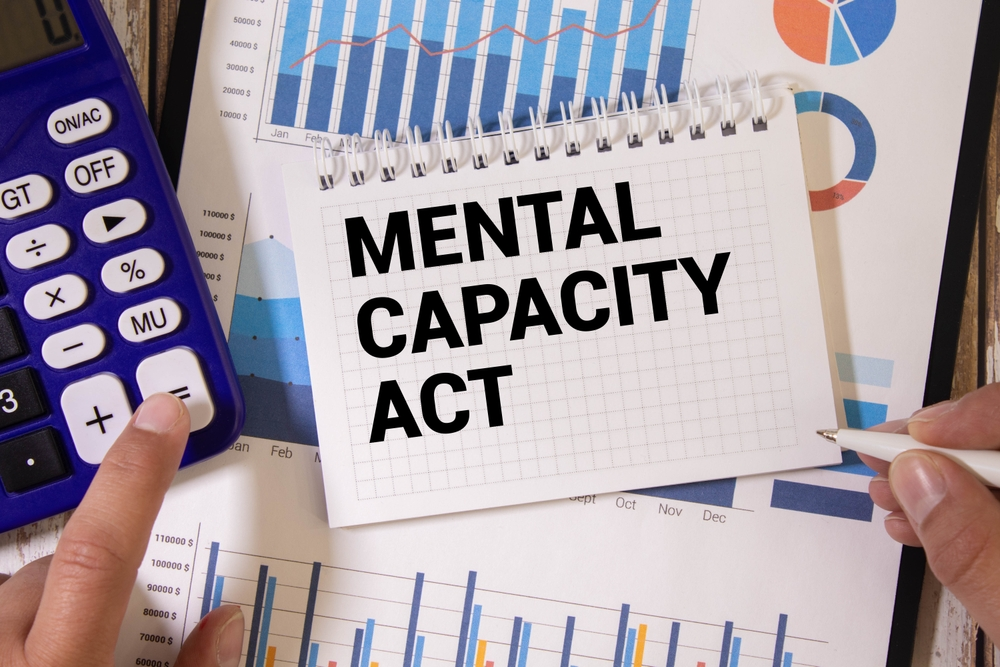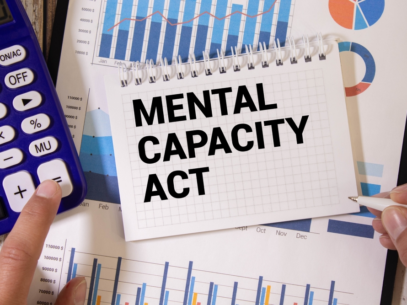24 May 2021
By Claire Webster (North Yorkshire) and Jack Skinner (Bradford)
About Claire and Jack
Claire is a Team manager for the Mental Capacity Act (MCA) / Deprivation of Liberty Safeguards (DoLS) Team in North Yorkshire; and is responsible for Liberty Protection Safeguards (LPS) implementation. Jack is a Team Manager for a Community Learning Disabilities Team in Bradford and a previous DoLS manager.
With the Liberty Protection Safeguards just around the corner (Current ETA April 2022) and with the new responsibilities placed on the new ‘responsible bodies’ (Local Authorities, Clinical Commissioning Groups & Hospital Trusts) it has never been more important for practitioners to embed MCA into everyday practice. As two self confessed MCA nerds, we decided to collaborate and put together an A-Z of the Mental Capacity Act. The following aims to bring together a selection of our favourite references to the Mental Capacity Act and associated guidance, legislation and case law.

A is for Advocacy
Advocacy comes in many shapes and sizes. It is a crucial role in supporting an individual to speak up, or to be their voice, for their views and wishes and is absolutely the cornerstone of social care. Having strong advocates is a sign of a well functioning system. This helpful document will give you a nod in the right direction if you need any help with an advocacy related decision:
B is for Balance sheet (and Best Interests)
Balance sheets are great. We use them all the time but in the context of MCA and decisions that can be made, a balance sheet really helps to show your working to anyone that might wonder what was considered and highlighting ‘relevant factors’ in the decision. It is important to note that balance sheets should be used as an aid to thinking, not as a substitute (see Re F (A Child) (International Relocation Cases) [2015] EWCA Civ 882). Often in case law you can see the use of the balance sheet process in the Court of Protection, particularly more recently when making decisions about giving the Covid 19 vaccination to individuals unable to consent and whose family were objecting against it. See the example below.
C is for Causative Nexus
Are you satisfied that the inability to make a decision is because of the impairment of the mind or brain? The Court of Appeal has made clear that the process to complete a capacity assessment should not start with determining the impairment or disturbance of the mind or brain – this should follow after the determination that a person is unable to understand, use, weigh, retain or communicate and then determine why that may be. Starting with that the person appears to have difficulty doing also helps you with the support principle: if you can help them overcome that difficulty, they have capacity to make the decision, and you don’t need go to further.
D is for Determination, Decision specific, and Dignity
No one should start a capacity assessment without being clear about the decision that needs to be made. Sometimes, decisions need to be broken down, there may be more than one decision to make at any one time. Don’t make it too difficult for someone to be a part of that decision by making it too complex or difficult to understand. Finally make sure to look at the final decisions together as a complete picture and ensure the outcomes of those decisions work together. Determination should be the determination to uphold rights but it is also an important term to differentiate between the process of thinking about capacity (the capacity assessment process) and the conclusion and recording (determination) of that thinking. This also relates to Dignity, and the importance of dignity in Mental Capacity Assessments. Advanced Statements and Advanced Decisions are vital here, dignity is subjective. To one person it may be- A statement not to receive Clinically Assisted Nutrition and Hydration (CANH) .To another it may be honouring their right to private and family life, respecting people’s wishes and feelings is key in promoting dignity in decision making.
E is for evidence
There is a reason it is regularly stated you need to ‘show your workings’ in Mental Capacity Assessments. Making any decision on behalf of an individual must be based on evidence.
F is for RE FX
The presumption of capacity is so important in MCA and this case has significant learning in that spending time getting to know the person can be make or break in assessing capacity. In this case the Social Worker had the advantage of being able to build up rapport over a number of visits whereas the medical professional cited in the judgment was unable to do this and it seems as though the two came back with quite different reports with the judge siding with the social workers conclusion that FX had capacity
G is for guidance
In particular differentiating between following guidance and following law. Differentiating between following ‘regulations’ (Law) and Codes of Practice (Guidance). One example of this is recent guidance on issues relating to testing, vaccinations and self-isolation. Some directions are set down in Law such as the need to self-isolate when you’ve tested positive for Covid-19.. Some directions such as the need to isolate after visiting certain places, is set in guidance (at the time of writing). What has never changed is the need to follow the Mental Capacity Act and Deprivation of Liberty Safeguards when implementing any restrictions on a person unable to consent to the arrangements. We rely on our legal services to interpret interactions between law and guidance.
H is for Happiness, Human Rights and Hayden
Happiness may seem a simple concept, however seldom is it a significant consideration in best interests decision making. We all strive for happiness, happiness means different things for different people. Striving for happiness also strives for Human Rights Based Practice. How can we forget the important quote from Munby ‘what good is making someone safer, if it merely makes them miserable’. The Human Rights Act should always be central to decision making. Understanding that when you make decisions on behalf of an individual, involving where they live, the care they receive and the contact they have with others – they’re all protected rights under the Human Rights Act. And Hayden – the Vice President of the Court of Protection and supplier of some of the more recent revered quotes in Mental Capacity Law:
I is for IMCAs
IMCAs (Independent Mental Capacity Advocates) are a safeguard for people who lack capacity to make some important decisions. The IMCA role is to support and represent the person in the decision-making process. Essentially they make sure that the Mental Capacity Act 2005 is being followed.
J is for JUMP
The Reason I Jump is a book written by Naoki Higashida and a reminder about what lengths we should be aiming for when working with people who have difficulty with communication. It will make you re-evaluate what lengths we should go to in order to support someone who has difficulty verbally communicating.
K is for CC v KK And K
“There is, I perceive, a danger that professionals, including judges, may objectively conflate a capacity assessment with a best interests analysis ‘CC v KK & STCC”
L is for Lasting Power of Attorney
The lawful authority to make decisions for someone when they are no longer able. Every so often we hear about situations where an attorney clearly isn’t acting in the persons best interest or that the professional involved hasn’t thought to check if an LPA exists. If in doubt you can check the status of an LPA below.
M is for Munby
And what will be his epitaph “What’s the point of making people safe if it merely makes them miserable”. That well spoken line is so true and so honest that it never gets old. Before his retirement Sir James Munby was one of the most prominent and well known Court of Protection Judges.
N is for Neary
Steven and Mark Neary are the pinnacle of why Human Rights based practice is so important. If you want an example of how NOT to use the Mental Capacity Act and Deprivation of Liberty Safeguards, read the outcome of London Borough of Hillingdon V Neary.
O is for Open Justice Project
A project founded by Celia Kitzinger and Gill Loomes-Quinn, it aims to make observing Court of Protection cases, more easily accessible to anyone wanting to learn more about how Mental Capacity Act cases are dealt with in Court. Celia and Gill helpfully blog cases that deal with complex issues such as life sustaining treatment, sex, and 21a appeals.
P is for Practicable steps
No one should be deemed to lack capacity to make a specific decision unless all ‘practicable steps’ have been taken to support them to make the decision. ‘Practicable steps’ might involve referring to supporting agencies such as advocacy, interpreters, Speech and Language Therapy, and learning disability nurses – to work with the person to help them understand the relevant information.
Q is for P&Q vs Surrey
The first decision on what constituted a Deprivation of Liberty, before the decision was finalised by the Supreme Court in ‘Cheshire West’. It involved ‘Mig and Meg’ an 18 and 19 year old in two different settings and opened discussion about the ‘relative normality’ of the arrangements based on the person’s needs, that later became part of the final Supreme Court Judgement and lady Hale declaring ‘A gilded cage is still a cage’.
R is for Ruck-Keene (Alex)
the face and name that comes to mind with anything Mental Capacity Law. Alex (along with his colleagues at 39 Essex Chambers) are the social care sectors go-to for advice on how to implement the Mental Capacity Act in practice and produce incredibly useful resources, that are both timely and informative. We recommend visiting (capacity law) and signing up for 39 Essex Chambers reports.
S is for Sex
The MCA can permeate every aspect of life up to and including the most intimate areas of someone’s private life. There have been a number of recent cases, testing the idea of capacity for sexual relations. The Most prominent being the Supreme Court ruling in the case of JB determining new relevant information when assessing capacity and that ‘Pragmatism does not require that consent to future sexual relations can only be assessed on a general and non-specific basis’. Capacity and sex – the Supreme Court decision in JB | 39 Essex Chambers, Capacity, consent and sexual relations – the Supreme Court decides – Mental Capacity Law and Policy. https://www.mentalcapacitylawandpolicy.org.uk/capacity-consent-and-sexual-relations-the-supreme-court-decides/
T is for talking Mats
A really helpful resource to aid decision making and to document a persons wishes & feelings on a specific subject. Search: ‘Talking Mats’
U is for unwise decisions
we all make them and people that have health and social care involved seem to have any decisions scrutinised as if somehow they have to be run by the professional involved. The wording of the Act is ‘a person is not to be treated as unable to make a decision merely because he makes an unwise decision’. This is an important nuance on the often-heard statement that a person has the right to make unwise decisions. There are plenty of great cases to provide examples, but one that always comes to mind is the ‘woman who lost her sparkle’ or ‘C’.
V is for voting rights and values
A lack of mental capacity is not a legal incapacity to vote.1 Persons who meet the other registration qualifications are eligible for registration regardless of their mental capacityThe Electoral Commission
Being aware of your value base is key to ensuring that you understand how to apply the Mental Capacity Act with a Human Rights focus. When you decide to complete a Mental Capacity Assessment, first ask why you think one is required and reflect on it.
W is for Wye Valley and wishes and feelings/will and preferences
We take note of Article 12 of the United Nations Convention on the Rights of People with Disabilities (CRPD) and want that to influence practice. The way we do that to be compatible with the Mental Capacity Act is that we pay close attention to wishes and feelings when constructing a best interest decision. That way we are ensuring that the person we are supporting has their voice right in the heart of decision making. You can see recent challenges in the Court of Protection, when trying to understand and achieve what a person really wants. This has been recently explored in decisions around vaccinations and withdrawing life sustaining treatment.
X is for Re X
One of the drawbacks (of which there are many) of the original DoLS scheme is the fact that when Supreme Court handed down the Cheshire West judgement, as well making applications soar through the roof it also posed the question about deprivation of Liberty in other settings such as shared lives schemes, supported living or the individuals own homes. The Re X procedure was the courts way allowing people to streamline the process. although it doesn’t seem very streamlined given the months it takes to process sometimes.
Y is for Re Y
A Supreme Court decision that not all cases regarding the decision to withdraw Clinically Assisted Nutrition and Hydration, need to go to Court for a decision.
As long as family and professionals are in agreement, the decision can be made by the relevant clinician, following the MCA – BMA guidance.
Z is for Zone of Parental Control
“People with parental responsibility may in certain circumstances […] consent on behalf of a child under 16 to them being given medical treatment or being admitted informally for such treatment.” The moment that a young person wakes up on the morning of their 16th birthday, they are presumed to have the capacity to make their own decisions under the MCA. If on their 16th birthday the person does not have capacity to make a particular decision, a decision will need to be made as to whether to use the MCA or whether the decision falls under the zone of parental consent. In Re D [2019] UKSC 42, the Supreme Court held that where a 16 or 17 year old child cannot (or does not) give their own consent to circumstances satisfying the ‘acid test’ in Cheshire West, and if state either knows or ought to know of the circumstances, then the child is to be seen as deprived of their liberty. That is so whether or not their parent(s) are either seeking to consent to those arrangements if imposed by others or directly implementing them themselves.


